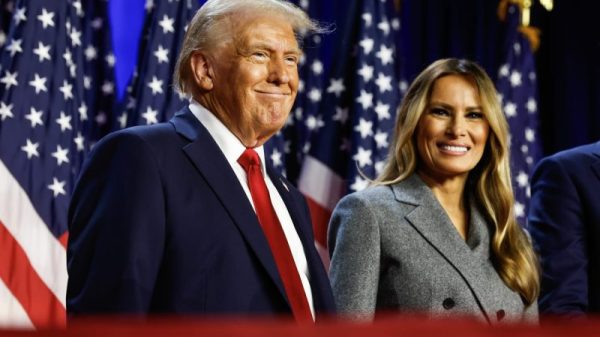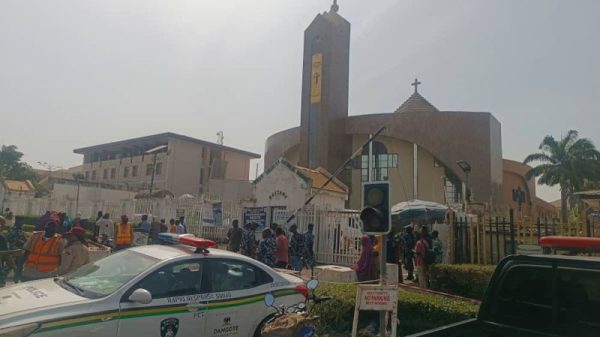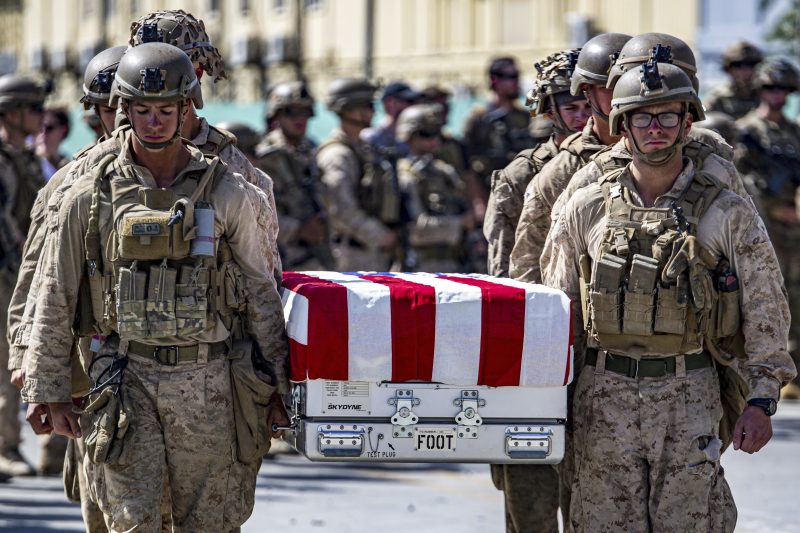The Republican leadership of the House Foreign Affairs Committee on Sunday released a sprawling report on the U.S. exit from Afghanistan three years ago, blasting President Joe Biden and his administration as the callous and “dogmatic” orchestrator of a foreign policy failure so extreme that it ranked “far worse” than even America’s catastrophic withdrawal from Vietnam in 1975.
Democrats swiftly dismissed the 240-page report, the product of a two-year GOP investigation, as “nakedly partisan” and as the cynical manipulation of tragedy for use as a “political football.”
The document arrives just two months ahead of a tightly contested presidential election between Vice President Kamala Harris and former president Donald Trump, and on the eve of their highly anticipated debate Tuesday in Philadelphia. Both parties said the timing of its release was intended to underscore Republicans’ recent efforts to revive public scrutiny of the withdrawal, which the committee’s chairman, Rep. Michael McCaul (R-Tex.), suggested could “disqualify” Harris in the minds of voters.
The committee has said as well that even with the report’s publication, its work will continue with the pursuit of additional witness testimony.
It was Trump, as president in February 2020, who negotiated the oft-criticized deal, known as the Doha agreement, with Afghanistan’s Taliban militant group to release 5,000 Taliban prisoners and withdraw all U.S. forces the following year.
In recent weeks, though, he has aggressively defended his decision to cut a deal while seeking to draw voters’ attention instead to the chaos that ensued in Kabul during August 2021, as Biden executed the agreement and brought America’s longest war to a messy and violent end. Trump last week accused Biden and Harris of bearing responsibility for the suicide bomb attack during the withdrawal that killed 13 U.S. service members “just like they pulled the trigger.”
But while the GOP report contains some minor new details, there are no major revelations that go beyond prior reporting already in the public domain via separate investigations conducted by the Defense Department, the State Department, news outlets and analysts, as well as the foreign affairs committee itself. And it contains no evidence that Harris played a major role in the withdrawal’s execution.
The report focuses intently on the chaotic and desperate noncombatant evacuation operation (NEO), a three-week crisis marred by images of horror as Afghans trying to escape the Taliban’s return to power died amid the crush of desperate crowds, while clinging to departing U.S. planes and in the suicide bombing just outside Kabul’s airport.
Among its findings that the committee emphasized were revelations first publicized months ago, such as the evacuation request coming on the day the Taliban entered Afghanistan’s capital, and one diplomat’s assertion that the U.S. Embassy’s top official had violated covid-19 protocols.
But the report stops short of presenting significant new evidence about the airport attack, an event Republicans have portrayed as the most egregious of Biden’s failures in overseeing the withdrawal. “Debate over whether the Abbey Gate attack was a lone suicide bomber or a complex attack, including gunfire after the bomb, has yet to be resolved,” the report says, citing a lack of aerial surveillance at the time of the attack, and the destruction of evidence by the Defense Department in the aftermath. A person familiar with the Defense Department’s investigation of the bombing said previously that it is true some photographs snapped by a sniper team overseeing the bombing site went missing.
And the report does not fulfill the GOP’s larger promise of accountability to the aggrieved families of the 13 slain Americans, some of whom appeared onstage at the Republican National Convention to show their support for Trump, who has shown them compassion and vowed transparency in ways that they say Biden has not.
“All they want — they want a phone call or a meeting from Harris or from Biden to say, ‘We know we did things wrong. It didn’t go well. And we are taking those lessons into account so that it never happens again,’” said Rep. Mike Waltz (R-Fla.), an Afghanistan war veteran who serves on the foreign affairs committee.
It’s unclear how deeply voters will consider the Afghanistan withdrawal when they cast their votes in November, and whether they are willing to link the catastrophic exit to Harris, whom Trump and McCaul have endeavored to cast as a critical decision-maker.
Within the pages of the report, “Biden-Harris administration” appears repeatedly — an adjustment that the committee’s Republican staff said it made in the final weeks of drafting the document. Yet there is scant mention of her as an individual, with the committee appearing to conclude that her most damaging behavior during the withdrawal was her absence of dissent.
“With the ascendance of Vice President Kamala Harris to the top of the Democratic presidential ticket, the GOP performance has reached a crescendo — Republicans now claim she was the architect of the U.S. withdrawal though she is referenced only three times in 3,288 pages of the Committee’s interview transcripts,” the panel’s Democrats said in a memorandum released simultaneously with the Republican report.
The Harris campaign said in a statement ahead of the report’s release that “Trump gave the Taliban everything they wanted,” referring to the Doha agreement. “Despite the deal’s drastic implications for U.S. military strategy and the safety of U.S. troops and allies, Trump left the Biden-Harris Administration with zero plans for an orderly withdrawal — only a dangerous, costly mess.”
The report’s larger conclusions are unsurprising. It pins the failures of the war’s endgame squarely on the Biden administration, which it says “prioritized the optics of the withdrawal over the security of U.S. personnel on the ground.” The administration’s last-minute move to organize the mass evacuation of noncombatants — largely Afghans who had worked in support of the U.S. mission — “created an unsafe environment” at Kabul’s airport, it says, ultimately resulting in the deaths of 13 service members.
“The Biden-Harris administration knew such an attack was not only possible but likely, yet they still failed to take the appropriate measure to mitigate the risk,” the report states.
What’s more, the report charges, Biden was determined to withdraw — regardless of the cost, the warnings from his generals or the apparent deterioration of security as the Taliban steadily gained ground. It also says officials “misled and, in some instances, directly lied to the American people at every stage of the withdrawal,” and accuses the entire administration of a vast “cover-up” led in large part by the White House National Security Council.
Sharon Yang, a White House spokesperson, characterized the GOP’s report as a “recycled, partisan” attack. “The fact remains,” she said in a statement, “that ending our longest war was the right thing to do and our nation is stronger today as a result.”
Republicans argue otherwise. The aftermath of the withdrawal has degraded U.S. national security and U.S. credibility on the world stage, as Afghanistan has again become “a haven for terrorists,” the report alleges, while America’s Afghan allies who were left behind have faced imprisonment, torture and murder at the hands of the Taliban. The chaotic exit “created a tidal wave of problems in Afghanistan, the United States, and around the world,” the report says, leaving billions of dollars’ worth of U.S. weapons and currency behind to the Taliban. And it “created a crisis within the U.S. military and among American veterans,” undermining recruitment and retention, it claims.
The report allots little space to the 19 years of war and policy decisions that came before the 2021 withdrawal, including under two Republican administrations. That task falls to the bipartisan congressionally mandated Afghanistan War Commission, which will deliver its own comprehensive report in 2026.
Democrats on Sunday panned the new report and noted the total absence of Democratic involvement in its drafting. “It is a politicized, cherry-picked report … a nakedly partisan campaign thing,” the top Democrat on the House Intelligence Committee, Rep. Jim Himes (Conn.), said on CBS News’ “Face the Nation.” That is all it was “designed to do,” Himes said — “not shed light on a tragedy.”
The foreign affairs committee’s Democratic staff, led by Rep. Gregory W. Meeks (D-N.Y.), produced a 56-page document that largely echoes the administration’s previous defense of its handling of the evacuation. It highlights, for instance, that when the evacuation was over, “the Biden Administration had facilitated the largest humanitarian airlift in U.S. history and ended the United States’ longest war” — a rosy gloss on an endeavor that left thousands of Afghan allies and their families behind.
Meeks, in a letter to fellow Democrats, characterized the Republicans’ report as having excluded “anything unhelpful to a predetermined, partisan narrative” and said their GOP colleagues took “particular pains to avoid facts involving former president Trump.”
Asked on “Face the Nation” whether the GOP’s investigation identified any “mistakes by the Trump administration,” McCaul singled out Zalmay Khalilzad, the envoy Trump dispatched to negotiate the withdrawal with the Taliban. The report heaps ample blame on him while seemingly excusing Trump from Khalilzad’s decision-making.
Khalilzad responded to some of the report’s allegations against him, including the charge that he kept military leaders in the dark during U.S.-Taliban negotiations. “That is factually incorrect,” Khalilzad wrote on social media. “Far from having been kept in the dark, the military … fully participated in the negotiations with the Taliban.” He cited the direct involvement of Gen. Mark A. Milley, then the chairman of the Joint Chiefs of Staff, and Gen. Austin “Scott” Miller, who was the top commander in Afghanistan at the time of the Doha talks. “No agreement was made on any military issue without the full knowledge of our military leaders and their participation in decisions made by our leaders,” Khalilzad asserted.
He also pushed back on the report’s claim that he personally excluded the Afghan government from the negotiations, writing that the Afghan government and the Taliban were never able to reach a “mutual agreement on a new government” and that “there was widespread pessimism” among U.S. officials “that the Afghan leaders would put their country first and seek a realistic compromise.”
For his part, Trump, in 2021, celebrated Biden’s decision to stick with the withdrawal agreement his administration made with the Taliban — “Getting out of Afghanistan is a wonderful and positive thing to do,” he said at the time — and in the weeks before the Afghan government’s collapse, he touted how he’d made it difficult for Biden to do anything other than follow through with the withdrawal he put in motion.
“They couldn’t stop the process,” he said at a political rally in June of that year, referring to the Biden administration. “Twenty-one years is enough, don’t we think?” he continued, overstating the length of the conflict by a year. “ … They couldn’t stop the process. They wanted to, but it was very tough to stop the process.”
Danielle Douglas-Gabriel and Marianna Sotomayor contributed to this report.







































